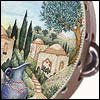Parshat Behalotecha concludes with the infamous episode of Miriam and Aaron talking about Moses behind his back:
Miriam and Aaron spoke against Moses concerning the Cushite woman he had married, for he had married a Cushite woman. They said, ‘Has the L‑rd spoken only through Moses? Hasn’t He spoken through us too?’ And the L‑rd heard.”1
This passage, however, leaves many questions unanswered. Who exactly was this Cushite woman? What did Miram and Aaron say and what was their intent? And how does whatever was said connect to the fact that G‑d spoke to Miriam and Aaron, not just Moses?
1. She Was Talking About Tzipporah
Most commentators, including Rashi, explain that Miriam was speaking about Tzipporah, Moses’ Midianite wife. The term “Cushite” is not literal; it’s a euphemism for beauty—just as a person of obvious complexion is universally recognized, so was Tzipporah’s beauty.
Miriam discovered—by overhearing Tzipporah’s lament—that Moses had separated from his wife in order to maintain prophetic readiness. She questioned this decision: “Why has Moses withdrawn from his wife? G‑d also speaks with me and with Aaron, yet we remain with our spouses.” Rashi emphasizes that even though she was motivated by concern and her words were not intended as an insult, since it involved discussing Moses’ private life without his knowledge, G‑d rebuked them.2
Baal Haturim adds that the Hebrew word "הכושית" (“the Cushite”), has the same numeric value (gematria) as the phrase "יפת מראה", which translates as “beautiful of appearance”—both totaling 736.
3. Miriam Accused Moses of Separating From His Wife Because She Was a Convert
Rabbi Naftali Zvi Yehuda Berlin (known by the acronym Netziv) suggests that Aaron and Miriam assumed that Moses had separated from her because, in their view, it was beneath his dignity to remain married to someone not from distinguished Israelite lineage. They argued that this was inappropriate since Moses had willingly married her, knowing her background. She hadn’t deceived him, so it was wrong for him to now cause her pain by separating from her.3 However, the real reason he separated was to maintain an appropriate state of readiness to converse with G‑d “face to face.”4
3. Miriam Was Referencing a Cushite Wife Moses Had Taken Years Earlier
Rashbam, who explains the “plain meaning” of these verses, understands the Cushite woman mentioned in the verse not as a reference to Moses’ wife Tzipporah, but a Cushite queen he married during the 40 years he ruled in Cush, as described in Chronicles.
Miriam was critical of the fact that he had taken this woman as a wife. However, Moses never had relations with her, and Miriam and Aaron were unaware of this when they spoke about him. This explanation fits the plain meaning of the verse, since if the complaint were about Tzipporah, there would be no need to introduce her as a “Cushite”—we already know she was a Midianite. Moreover, Tzipporah could not accurately be called a Cushite, as Midian descended from Keturah, the wife of Abraham, whereas Cush descended from Cham.5
This is similar to Bechor Shor’s reading, who articulates Miriam’s complaint: “Was there no woman among the daughters of Israel for Moses to marry, that he went and took a wife from among the Cushites, who are uncircumcised? Is it because G‑d speaks with him that he holds himself above others—too proud to marry a Jewish woman, seeking instead a wife from afar?”
He explains that the fact that Moses married Tzipporah, who was also not from the descendants of Jacob, was not something to be criticized, as he had no control over those circumstances. He had to flee Egypt to Midian after Pharaoh sought to execute him and was therefore not able to marry a woman of Jewish descent.6
4. She Was Criticizing the Fact That He Married Tzipporah in the First Place
Some commentators,7 while agreeing that the criticism was not about Tzipporah’s appearance or character, understand it as questioning how Moses—Israel’s greatest prophet—could have married a foreign woman at all. These views draw on the earlier tradition that Moses once married a Cushite queen, but apply that critique instead to Tzipporah, his Midianite wife. In this reading, Miriam and Aaron weren’t criticizing Moses for separating from his wife, but for marrying someone not from the daughters of Israel in the first place.
5. It was Not What She Said
In a complex talk exploring Rashi’s explanation for the juxtaposition between this episode and the disastrous mission of the Spies that immediately follows, the Rebbe uncovers the core of Miriam’s error.
Her mistake was not that she wished to speak ill of her brother Moses, as Rashi points out: “She did not intend to speak negatively about him.”8
So what, then, was her wrongdoing? The issue, as Rashi explains, was that she was “involved in speech”—she was punished simply for speaking about her brother at all. If Miriam observed something in Moses’ conduct that troubled her, the proper course of action was not to discuss it with someone else. Such conversations rarely lead to a constructive outcome. If she truly had a concern, she should have addressed it—discreetly and directly—with Moses himself.9







Join the Discussion